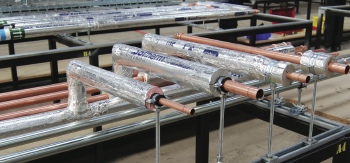Delivering the benefits of prefabrication

While the benefits of the offsite manufacturer of modular pipework systems are proven, success depends on meticulous planning — says Bob Hughes Pipe Center’s modular-engineering division.
Offsite fabrication of modular pipework systems is emerging as a mainstream approach because it addresses many, if not most, of the key challenges facing the industry today.
Given the economic realities, pressure to reduce build costs and shorten project timescales continues. In both areas, the offsite approach delivers major and quantifiable benefits to the contractor and end user.
In terms of cost, our experience over the past five years shows that reductions of 10 to 20% can be achieved, compared with a traditional approach involving pipework installation on site
This is obviously attractive and a very worthwhile saving. However, in our experience it is by no means the only, or even most important, benefit.
The ability to reduce project lead times by shortening installation time on site is a huge advantage of the offsite approach. This can give contractors a compelling advantage in tendering for projects where time on site is an issue.
It is not only in relation to fast-track projects per se that offsite scores. There are some projects where, owing to the sequencing of the build programme or the nature of the construction methods used, the window available for installing pipework is drastically reduced.
For example, we have been involved with some school projects where it simply would not have been possible for building-services pipework to be installed by any other approach, due to the tight timescale available for installation on site.
In these cases, while offsite manufacture and assembly was not envisaged as the chosen approach in the initial build plan, it came to the rescue once the realities of trying to install using traditional methods dawned.
The services that can be prefabricated into modules offsite have expanded recently beyond the traditional domestic hot and cold water, heating and chilled water, and electric trays. We now build in fire, data and security systems and prefabricated ductwork — employing specialist ductwork construction teams alongside our in-house pipework teams.
This increased sophistication requires careful planning to ensure any problems are identified at the design stage and ironed out.
Good communication has always been a fundamental requirement of the offsite approach, and a collaborative approach is a prerequisite of success. The key is sharing information and resolving issues before a boot lands on site.
The importance of this aspect cannot be overstated. We operate joint project teams — with representatives of the consultant, end user and contractor working alongside our own design team. Producing offsite pipework systems to exacting tolerances for a large building, or even a whole estate, requires meticulous design planning. It is here that the victory is won, and the project effectively delivered.

Another important benefit is time certainty. Working in factory conditions removes uncertainty — it is guaranteed to deliver on time, every time. Projects are no longer at the mercy of the vagaries of the weather or manpower availability.
The issue of skill shortages remains a live one for the industry. With the offsite approach, completed pipework modules — fully pre-tested in the factory — are transported to site, lined up in position and simply connected up. This overcomes onsite skill shortages and labour issues, which may be a problem on some projects or in some areas of the country.
The quality and efficiency of the on-site installation process is now proven. With a conventional approach, site efficiencies of 35 of 55% are regularly recorded due to poor levels of information, with trades left to resolve design conflicts on site. Our offsite approach uses special software to create co-ordinated drawings backed up by full installation information, resolving potential problems and delivering site efficiencies of up to 85 to 90%.
To these positives must be added the benefits of reduced materials usage and carbon savings. Prefabricating in a factory is much more efficient in terms of materials wastage than installation in the rough and tumble of site conditions.
My own company secured a project on the Scilly Isles partly as a result of the materials advantages of the offsite approach; there is a strict waste policy in force on the islands, and traditional installation methods were unable to comply.
As end users and developers pursue green credentials and BREEAM status, the issue of carbon emissions in construction comes increasingly to the fore. In the traditional approach to installation, pipework and related components are delivered to site by perhaps dozens of vehicles, with components individually packaged and contributing to carbon emissions and wastage.
With the offsite approach, the entire pipework system is delivered by a single vehicle, minimising carbon emissions, congestion and health and safety risks.
If all this were not enough to convince even the most hardened traditionalist, the clincher must surely be the dramatic improvements in health and safety delivered by the offsite method. Working in clean, well-lit factory conditions is infinitely safer than working on a building site. The reduction in the number of accidents, particularly resulting from working at height and with hot works, is documented.
I believe the case is proven. Offsite building-services solutions are cheaper, quicker, greener, safer and higher quality than systems installed traditionally on site. For these reasons, I believe the offsite approach will increasingly be adopted by the industry as a mainstream solution.
Bob Hughes is general manager for modular engineering at Pipe Center.







